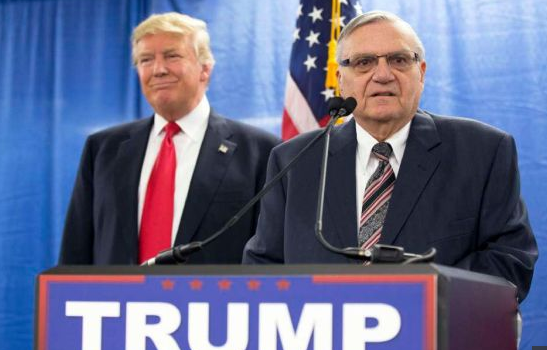Donald Trump’s decision to pardon Joe Arpaio — his first exercise of the Article II prerogative — is not an act of mercy. It does not mend, it provokes. It neither asks for remorse nor enjoins an expression of regret from the recipient. It sets a man who offended society’s laws above the society that tried to hold him accountable. We are the sinners; Sheriff Joe is invited to forgive us. Thus has the President of United States contorted moral reasoning and constitutional propriety.
Arpaio is a former sheriff of Maricopa County, Arizona, where he made a name for himself as a tough cop on the illegal immigration beat. He sought out this celebrity, ever-eager for the cameras, a drawled soundbite always on hand. Arpaio was a tabloid TV crime-fighter, Dirty Harry for the Nancy Grace era. In the early days, though, he was what the residents of Maricopa County wanted and when Barack Obama arrived on the scene, and openly refused to enforce immigration laws, Arpaio hit pay dirt. He became ‘America’s Sheriff’ to cable news producers and played up to his brute image with policing and incarceration practices lifted from a third-world labour camp.
Arpaio set up Tent City, an open-air jail that he described proudly as a ‘concentration camp’. There prisoners, mostly suspected illegal aliens, were kept in boiling temperatures, forced to wear pink underwear, and paraded through the streets. Female prisoners were not immune from his harsh measures — when he brought back chain gangs, he create a special one just for women. Prisoners were treated worse than dogs— literally; he spent more money on food for his guard dogs than for those in his custody.
Amazingly to squishy European ears, none of that is what landed him in trouble. Rather, he was convicted of contempt of court for defying a judge’s order to stop profiling Hispanic drivers in traffic stops. He was due to be sentenced later this year, having already lost re-election to a new sheriff who has closed down Arpaio’s ‘concentration camp’. In pardoning him, Trump has sent another signal to his hardcore, nativist supporters, though the President has never sufficiently mastered the dogwhistle so that the rest of us can’t hear it.
We are becoming accustomed to authoritarian nationalism, which looks likely to stand us in good stead for the next decade or so. What is so offensive about Trump’s pardon is its reminder of his essential tackiness. He is transfixed by celebrity, in the sway of television like so many of his generation have been. America is not wanting for thug cops but Arpaio received a pardon because he has been on Fox News, Trump’s information source of choice, and because he played up to the TV archetype of the lawman who shoots first, Miranda be damned.
On some level, Trump perhaps believes he has struck a blow for every hard-drinking Irish cop who ever had the Captain on his ass for slapping about some punk mugger or who got gunned down by a needle-pusher two days before retirement. When Trump looks at Arpaio he sees Sergeant Joe Friday, even as the rest of us see Maniac Cop.
But Trump’s real offence is not pop-cultural; it is to the constitution he vowed to uphold. In Federalist No. 74, Hamilton describes the presidential pardon as ‘the benign prerogative’ and reasoned that, without mercy, ‘justice would wear a countenance too sanguinary and cruel’. Trump has turned the prerogative malign, exploiting a mechanism for compassion to excuse and extol a man who revelled in the sanguine and the cruel — who made a career out of it. The President has shown contempt for every other American ideal so justice was lucky to make it this far.
Mercy is not easy. President Obama commuted the sentence of Chelsea Manning, who as Private Bradley Manning betrayed the United States and put lives at risk. Manning, however, expressed remorse. Whether pardoning a traitor is wise or just is questionable but it is merciful. It is impossible to forgive Arpaio because he does not believe he has trespassed. He boasts of his crime; he is prideful. And now he has a piece of paper signed in the Oval Office to tell him he was right all along.







Comments